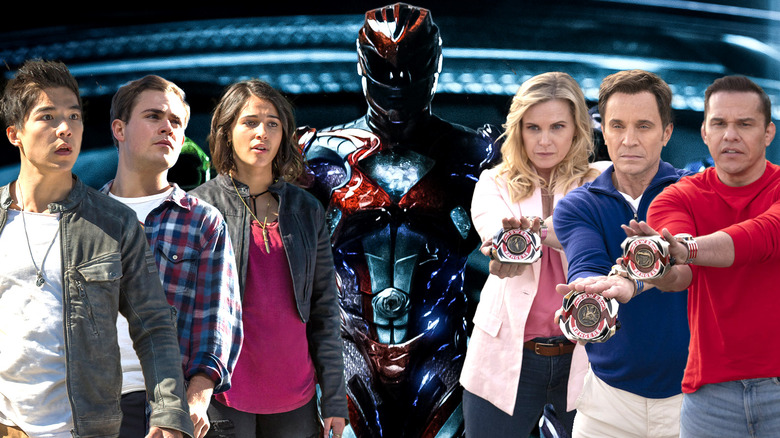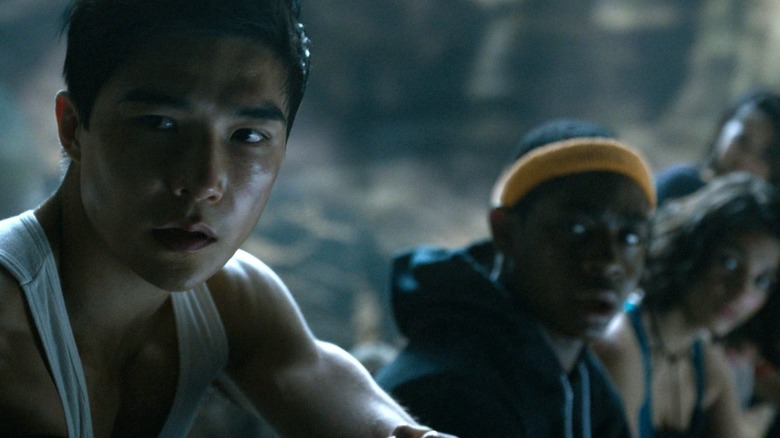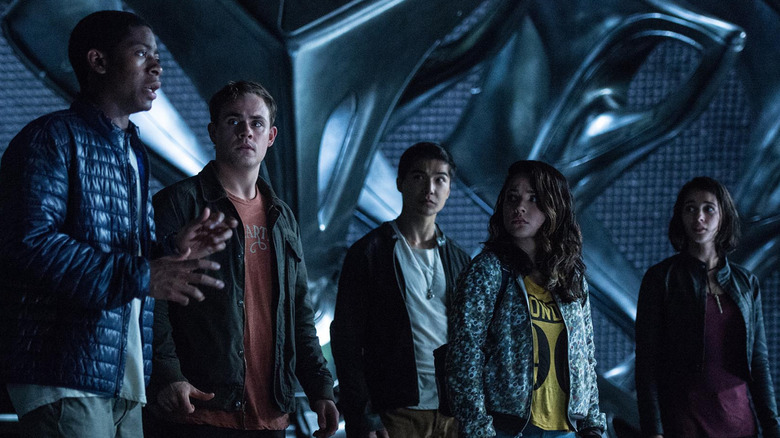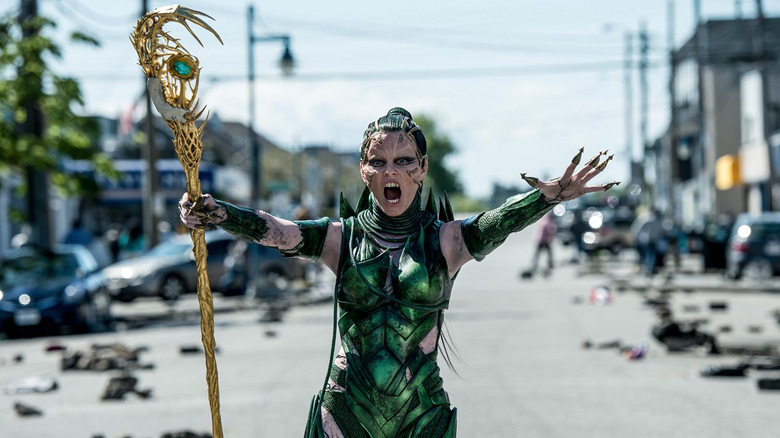The New Power Rangers Leans Hard On Nostalgia, But The 2017 Reboot Was A Weird & Underrated Gem
It might be the 2020s, but "Mighty Morphin Power Rangers" fans are gearing up for an abundance of new material that will transport them back to their yesteryears. The trailer for Netflix's 30th anniversary special is fueled by nostalgia, for one, and there's also a Netflix reboot on the way sometime in the future, that will undoubtedly provide another take on the colorful heroes.
However, amidst all the exciting new content, viewers shouldn't forget something: the 2017 reboot, forgotten as it may be, was genuinely awesome.
While a "Power Rangers 2" never happened, the first film's darker, more nuanced approach brought newfound depth and reality to an often over-the-top franchise, with an engaging story and a talented cast that included actors like Elizabeth Banks, Ludi Lin, Bryan Cranston, and Dacre Montgomery. The movie reintroduced all the classic Rangers, but in unexpected ways that built off their stock character types from the original series to craft flawed and fleshed-out teenagers (yes, with attitude). While the new programming looks exciting, the trailer indicates that the 30th anniversary special is more about rehashing the past than creating something new — which is fun, but less exciting than the fresh promise of the 2017 movie.
This leaves us yearning for a continuation of the 2017 reimagining, which grounded the heroes with realistic depictions and relatable identities. Rather than heavily lean on the tried and true, the future of "Power Rangers" should continue this method in favor of just replicating the old stories, again and again. The more serious tone made for a unique, under-appreciated gem that deserves credit for what it achieved.
The edgy Power Rangers reboot was ahead of its time
Though this new generation of Power Rangers isn't the optimistic, color-coordinated bunch we met in the 90s, they're still the same teenagers with attitude that Zordon (David J. Fielding) once recruited to save the world. Each of the characters shares a name and basic archetype with their 90s equivalent, but with new quirks, insecurities, and painful backstories.
The film puts them together not by decree of Zordon, but as a bunch of rebellious misfits in a "Breakfast Club" situation, with the teens serving time together in detention. This sets the tone for the rest of the film, as the soon-to-be Rangers search for identity — both as individuals and as a super-powered team.
Like the original series, "Power Rangers" is a lesson in responsibility and teamwork, but the film also features far more diversity than most superhero flicks of its era — the Blue Ranger (RJ Cyler) is autistic, for instance, while the Yellow Ranger (Becky G.) is LGBTQ+ — and themes of acceptance, individuality, and found famly are also prevalent in the narrative. The visual indicator of their outfits, with their signature Ranger colors, serve as reflective accents rather than focal centerpieces. All these well thought-out changes and narrative decisions allow the movie to both pay tribute to the past while also building something new, and charting a future course all its own. This was a risky move for the franchise — one which, sadly, resulted in a smaller box-office return – but it showed that the Power Rangers could, arguably, be at their best with a darker setting.
The 2017 Power Rangers reboot didn't overly rely on nostalgia
While many of our current franchises are fueled by nostalgia, 2017's "Power Rangers" paid service to the past while telling a gripping story of its own. Though you'll still find Zordon (Bryan Cranston) and Alpha 5 (Bill Hader), Megazords, and riveting fight sequences, most of the film actually takes place with the heroes out of their uniforms. This showcases the astonishing and diverse cast including Dacre Montgomery (Jason), Naomi Scott (Kimberly), RJ Cyler (Billy), Ludi Lin (Zack), and Becky G (Trini), and the film makes a point to subvert the problematic casting of the original series (you know what we're talking about) through its character and storytelling decisions. Power Rangers notably featured Trini as a lesbian superhero back in 2017, a full four years before Marvel Studios featured its first openly gay superhero, Phastos, in "Eternals."
The nostalgia quality is still present in "Power Rangers," however it's not nearly as heavy handed as the 30th anniversary seems to be. The costumes were updated to be cosmic, shimmering armor rather than brightly colored spandex suits. The 2017 film even features the recognizable "Go, Go Power Rangers" theme — but it holds back from using it until the very end, as the Rangers victoriously take down the tyrannical Rita Repulsa (Elizabeth Banks), thereby making the theme ring more powerfully and dramatic than it ever did in the series.
To top it off, "Power Rangers" also lets even Zordon and Rita be complex, expanding upon their backstories and giving them a history together. It was the perfect setup for a longer franchise that never happened.
The idea for a Power Rangers sequel is nothing less than evergreen
"Power Rangers 2" would've been even better than the first one. The movie's climax almost ensured it.
After the larger-than-life end battle with Rita, the Rangers return to school and learn to balance their new lives. However, their lineup does leave room for a sixth member of the crew, as the tantalizing mid-credits scene teases — when the teacher calls out "Tommy Oliver?" to the empty room, promising the arrival of everybody's favorite green-suited antihero (and future team leader) in the next one.
Ultimately, the ticket sales didn't reward the first movie, and the non-existent sequel was dead on arrival. Which is a bummer, because an adaptation of the five-part "Green with Evil" episode arc is the perfect continuation of the 2017 "Power Rangers" reboot. Tommy Oliver's (originally played by Jason David Frank) storyline is legendary in the universe, and also fully in line with the film's prevalent theme of identity. It's so easy to imagine Rita returning (as she always does) and with the film positing her as the former Green Ranger, gifting her gear and armor to the main team's fellow student, who serves her bidding ... until he eventually overcomes Rita's brainwashing to join an extraordinary league of heroes, of course.
The unconventional approach that "Power Rangers" took might've not been a box office smash, but the movie certainly resonated with viewers who were ready for something different and more representative of today's teenagers. Even with the new material debuting soon, die-hard fans still discuss the impact of the 2017 film for the chances it took. All in all, "Power Rangers" deserves a reassessment from casual viewers, as well.



